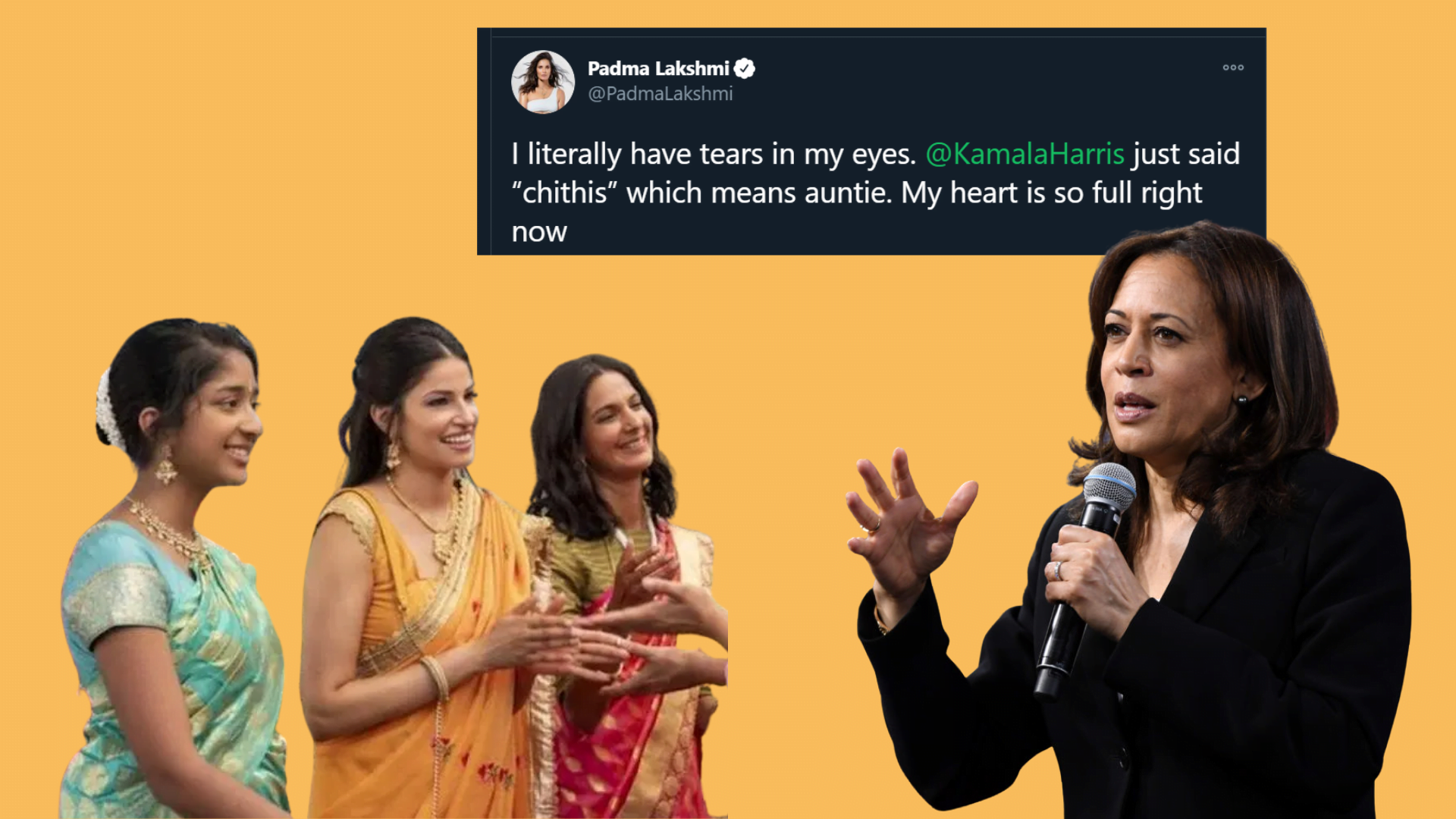When Kamala Harris was announced as Joe Biden’s running mate, the topics of representation and diversity rapidly took over the headlines. Numerous people swiftly pointed out that Kamala Harris fits the identities of African American, Indian, South Asian, and also, that of a woman. Many younger generation South Asian diasporas on social media stated that they did not admire Kamala because they firmly disagreed with her on many political issues. However, older generation South Asians seemed to grasp on to the fact that Kamala has South Asian heritage. Like Padma Lakshmi who got teary eyed when Kamala Harris said chithi (Tamil word for aunt) in her Democratic National Convention speech. Countless aunties and uncles completely based their support for her based on skin color. Needless to say, representation is viewed in contrasting ways among different generations.
Also read: Kamala Harris Isn’t The South Asian Feminist Role Model We Want
Older generation South Asians seemed to grasp on to the fact that Kamala has South Asian heritage. Like Padma Lakshmi who got teary eyed when Kamala Harris said chithi (Tamil word for aunt) in her Democratic National Convention speech. Countless aunties and uncles completely based their support for her based on skin color. Needless to say, representation is viewed in contrasting ways among different generations.

The earliest representation of African American romance in American movies was depicted in “Something Good – Negro Kiss.” The film was silent and tremendously brief, but it provided the viewers with a positive representation of a group that was subjected to extreme prejudice and genocide. Fast forward to today, and we have a lot more black and POC (persons of colour) representation within the media industry. Films and BTS scenes of “Black Panther” and “Crazy Rich Asians” provided the audience with innovation, gratitude, and contentment. As of now, countless movies/TV shows with the representation of Asian, African American, female, LGBTQ+, etc. have been released.

When we discuss representation, we often fail to examine what effects it will have on the group being represented. Within the conversations, we never address the accuracies of stereotypes and negative representation.
The Netflix-released American sitcom “Never Have I Ever” tried to portray the navigations of a young South Asian girl through the clashes of Indian and American culture. Prior to the show release, there were several criticisms relating to the promotion of Indian stereotypes, disrespect towards Hindu gods, and inaccuracies of Indian womanhood. Though evidently some criticisms of the show were exaggerated, nonetheless, one striking detail to note was the promotion of Indian stereotypes within the show. The main character, Devi Vishwakumar, is a straight-A “nerd” whose major desire in life is to go to an Ivy League college.
Usually, we ask for representation in hopes of getting rid of stereotypes. However, in order for the representation to be somewhat accurate, it would have to incorporate some stereotypes. The reality is that while stereotypes are frequently over-exaggerated, they do hold some truth. Not all Indian Americans are intelligent or aspire to join an Ivy League, but it is not inaccurate to say that education within the Indian community is highly prioritised.
In general, the show displayed representation of an extremely liberal Indian family. Devi’s mom was only somewhat upset by her white boyfriend, allowed her to curse in the house, and did not have objections to her clothes. It is not inaccurate to say that many Indian/desi parents would not hesitate to inflict violence upon their daughters for dating, swearing, partying, lying, or wearing “short” clothes.
After the show was released, what changed for the Indian/Desi community? Someone that looked like us appeared on our TV screens, but how did that help our community? Often, we hear that representation will be the solution to racism. If a racist person watched the show, would their perception of Indians/desis change? Almost certainly, no. The reality is that in today’s world, representation does not help us that much. Having someone that looks like us on screen can not terminate the problems that our communities go through. In order for the representation to be accurate, it has to incorporate stereotypes rather than eliminating them.
Also read: Netflix’s Never Have I Ever & Its Savarna Storytelling Is Irresponsible And Ignorant
/cdn.vox-cdn.com/uploads/chorus_image/image/66741656/Screen_Shot_2020_05_01_at_3.54.09_PM.0.png)
A vast majority of representation is based on inaccurate concepts that a majority can not relate to. We repeatedly cling on to representation as a solution to all our problems, but it is safe to say that we will not stop experiencing racism simply because people of our skin color appear on TV.
Ironically, most people argue for representation in hopes of getting rid of stereotypes. Due to the clashes between these viewpoints, a vast majority of representation is based on inaccurate concepts that a majority can not relate to. We repeatedly cling on to representation as a solution to all our problems, but it is safe to say that we will not stop experiencing racism simply because people of our skin color appear on TV. If that were the case, we would have stopped experiencing racism after 9/11. Yet, after 9/11, racism and hate crimes against South Asians, Blacks and other POC have only substantially increased.





One reason that such representations in mainstream do not made a difference because they are far fetched and exaggerated. Not ‘many’ families resort to ‘violence’ for wearing short clothes. Yes, there’s a stiff restriction but ‘violence’ by ‘ many’ is exaggeration. This takes such representations away from reality on ground and make them useless.
would it be right though to compare representation in a television show to representation in politics which directly leads to legal reforms?